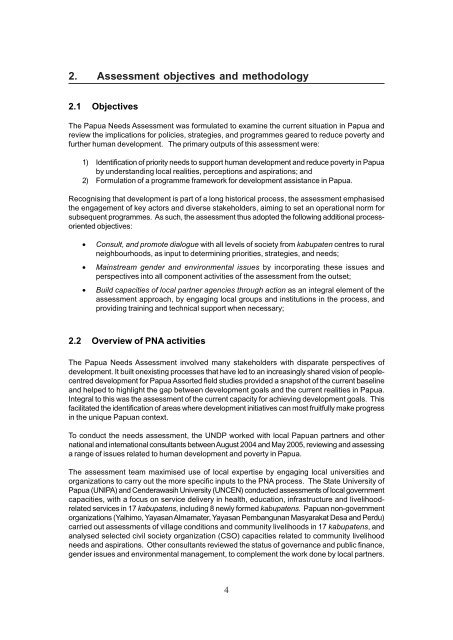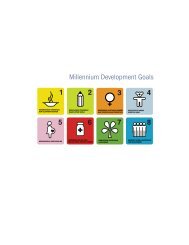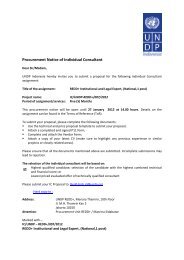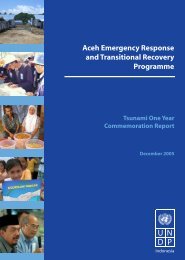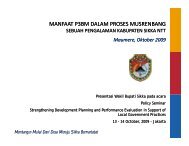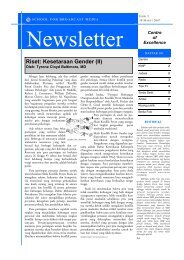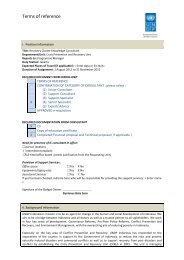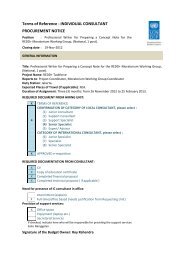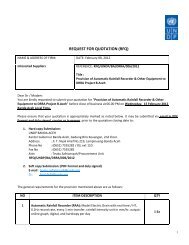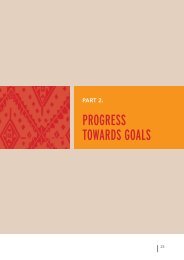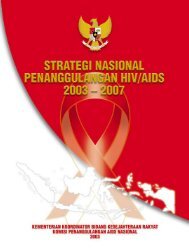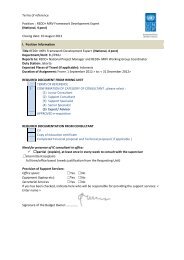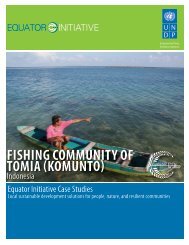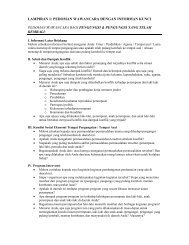Papua Needs Assessment - UNDP
Papua Needs Assessment - UNDP
Papua Needs Assessment - UNDP
Create successful ePaper yourself
Turn your PDF publications into a flip-book with our unique Google optimized e-Paper software.
2. <strong>Assessment</strong> objectives and methodology<br />
2.1 Objectives<br />
The <strong>Papua</strong> <strong>Needs</strong> <strong>Assessment</strong> was formulated to examine the current situation in <strong>Papua</strong> and<br />
review the implications for policies, strategies, and programmes geared to reduce poverty and<br />
further human development. The primary outputs of this assessment were:<br />
1) Identification of priority needs to support human development and reduce poverty in <strong>Papua</strong><br />
by understanding local realities, perceptions and aspirations; and<br />
2) Formulation of a programme framework for development assistance in <strong>Papua</strong>.<br />
Recognising that development is part of a long historical process, the assessment emphasised<br />
the engagement of key actors and diverse stakeholders, aiming to set an operational norm for<br />
subsequent programmes. As such, the assessment thus adopted the following additional processoriented<br />
objectives:<br />
• Consult, and promote dialogue with all levels of society from kabupaten centres to rural<br />
neighbourhoods, as input to determining priorities, strategies, and needs;<br />
• Mainstream gender and environmental issues by incorporating these issues and<br />
perspectives into all component activities of the assessment from the outset;<br />
• Build capacities of local partner agencies through action as an integral element of the<br />
assessment approach, by engaging local groups and institutions in the process, and<br />
providing training and technical support when necessary;<br />
2.2 Overview of PNA activities<br />
The <strong>Papua</strong> <strong>Needs</strong> <strong>Assessment</strong> involved many stakeholders with disparate perspectives of<br />
development. It built onexisting processes that have led to an increasingly shared vision of peoplecentred<br />
development for <strong>Papua</strong> Assorted field studies provided a snapshot of the current baseline<br />
and helped to highlight the gap between development goals and the current realities in <strong>Papua</strong>.<br />
Integral to this was the assessment of the current capacity for achieving development goals. This<br />
facilitated the identification of areas where development initiatives can most fruitfully make progress<br />
in the unique <strong>Papua</strong>n context.<br />
To conduct the needs assessment, the <strong>UNDP</strong> worked with local <strong>Papua</strong>n partners and other<br />
national and international consultants between August 2004 and May 2005, reviewing and assessing<br />
a range of issues related to human development and poverty in <strong>Papua</strong>.<br />
The assessment team maximised use of local expertise by engaging local universities and<br />
organizations to carry out the more specific inputs to the PNA process. The State University of<br />
<strong>Papua</strong> (UNIPA) and Cenderawasih University (UNCEN) conducted assessments of local government<br />
capacities, with a focus on service delivery in health, education, infrastructure and livelihoodrelated<br />
services in 17 kabupatens, including 8 newly formed kabupatens. <strong>Papua</strong>n non-government<br />
organizations (Yalhimo, Yayasan Almamater, Yayasan Pembangunan Masyarakat Desa and Perdu)<br />
carried out assessments of village conditions and community livelihoods in 17 kabupatens, and<br />
analysed selected civil society organization (CSO) capacities related to community livelihood<br />
needs and aspirations. Other consultants reviewed the status of governance and public finance,<br />
gender issues and environmental management, to complement the work done by local partners.<br />
4


